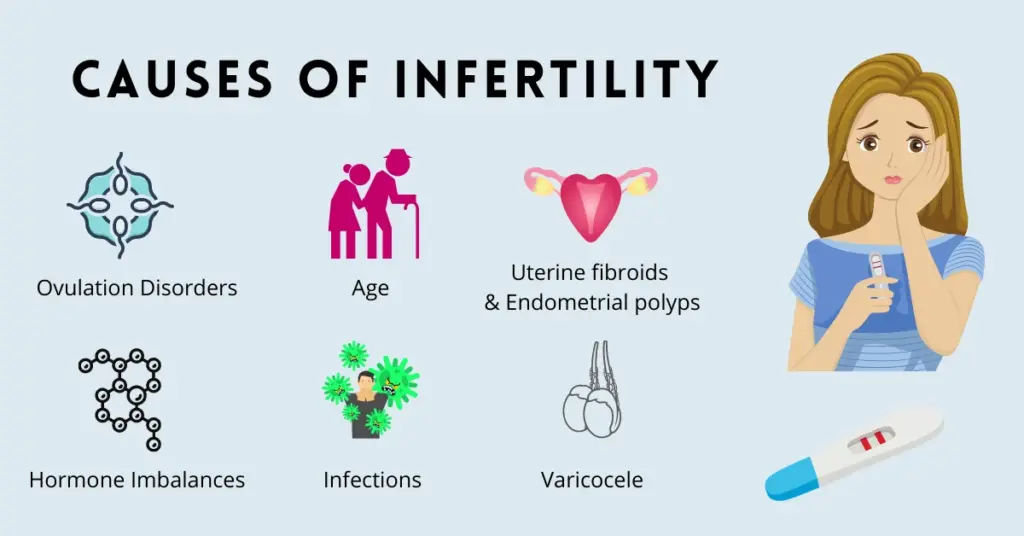
Understanding Infertility: Causes, Symptoms, & Treatment Options
Infertility tends to be quite an arduous journey emotionally for both partners but is very common among couples in the UK. Among its definitions, the inability to conceive after one year of having unprotected intercourse has been used as one of the many definitions for the issue. Infertility may stem from a selection of different causes, including medical, hormonal, or lifestyle factors.
What Is Infertility?
Infertility is divided mainly into the following two categories: Primary infertility is a condition which has not allowed one to conceive after trying consistently for at least a year. Secondary infertility, on the other hand, refers to a condition whereby a couple has previously conceived but does not conceive newly. Affecting men and women alike, there is a need for both partners to undergo evaluation in case of challenges in conception.
Common Causes of Infertility

Female Infertility Factors
- Ovulation Disorders – Conditions such as polycystic ovary syndrome (PCOS) and thyroid irregularities affect regular ovulation.
- Fallopian Tube Blockages – Obstruction is often due to pelvic inflammatory disease (PID) or endometriosis.
- Uterine Abnormalities – These may interfere with implantation due to fibroids, polyps, or congenital defects.
- Age-Related Decline – Fertility naturally declines after age 35. The decrease is more pronounced after 40.
Male Infertility Factors
- Low Sperm Count or Poor Motility – This affects the ability of sperm to reach an egg and fertilise it.
- Varicocele – This is enlarged veins in the testicle that can affect sperm production.
- Hormonal Imbalances – Conditions like low testosterone can reduce fertility.
- Lifestyle Factors – Smoking, excessive alcohol, and being overweight compromise sperm health.
Recognising the Signs of Infertility
In Women
- Menstrual cycles that are irregular and, in some cases, absent.
- Painful periods or pelvic pain (possible endometriosis).
- Hormonal disorders—excess facial hair or acne.
- Recurrent losses during or after conception (two or more consecutive pregnancy losses).
In Men
- Oligospermia (confirmed through semen analysis).
- Difficulty achieving or maintaining an erection or problems with ejaculation.
- Swelling or pain in the testicles.
- Decreased sexual desire or signs of hormonal imbalance.
Most individuals have no obvious symptoms, so medical diagnosis may be important if pregnancy has never been achieved after one year (or six months for women over 35).
Diagnosing Infertility at Chase Lodge Hospital: Tests and Procedures
Chase Lodge Hospital, one of the best infertility clinic in London provides full fertility investigations to identify the underlying causes.
For Women
- Blood Tests – Check hormone levels (FSH, AMH, progesterone).
- Ultrasound Scans – Provide information about ovarian reserve and conditions like PCOS.
- Hysterosalpingography (HSG) – An X-ray of the fallopian tubes and uterine cavity to check tubal patency.
- Laparoscopy – A minimally invasive surgical procedure to diagnose endometriosis or pelvic adhesions.
For Men
- Semen Analysis – Checks sperm count, motility, and morphology.
- Hormonal Testing – Measures testosterone and other key hormones.
- Scrotal Ultrasound – Detects varicoceles or blockages.
Treatment of Infertility
Infertility treatment is based on the specific cause, and Chase Lodge Hospital customizes treatments to individual patients.
Medications
- Clomiphene citrate stimulates ovulation in women with polycystic ovary syndrome.
- Metformin manages insulin resistance in patients with polycystic ovary disease.
- Hormonal injections like gonadotropins are used for best infertility treatment in more advanced cases.
Surgical Interventions
- Laparoscopic or endoscopic surgery corrects endometriosis, fibroids, or tubal obstruction.
- Varicocele repair improves sperm production in men.
Assisted Reproductive Technologies (ART)
- Intrauterine insemination (IUI) places washed sperm directly into the uterus.
- In vitro fertilisation (IVF) combines eggs and sperm in a lab, with embryos transferred to the uterus.
- Intracytoplasmic sperm injection (ICSI) may help with male infertility by injecting a single sperm into an egg.
Lifestyle and Supportive Care
- Weight management and dietary adjustments can improve fertility.
- Smoking cessation and reducing alcohol consumption are also beneficial.
- Couples may benefit from emotional support and counselling for infertility-related stress.
Choosing The Best Infertility Clinic in London
When selecting an infertility clinics UK, several factors should be considered. Success rates, particularly clinic-reported IVF success rates, are important. Consultant expertise, especially specialists with experience in your specific condition, is another key factor. Personalised care, where the clinic offers tailored infertility treatment plans, is also essential.
At Chase Lodge Hospital, our dedicated fertility specialists provide compassionate, evidence-based care to support your journey to parenthood.
Conclusion
Infertility can be a complex and emotionally taxing experience, but advancements in medical treatments offer hope for many couples. Recognising the signs of infertility early and seeking expert advice can significantly improve outcomes. If you have been struggling to conceive, Chase Lodge Hospital is here to help with cutting-edge diagnostics and personalised best infertility treatment.
Take the Next Step
If you suspect fertility concerns, book a consultation with our specialists today. Visit Chase Lodge Hospital’s Fertility Services for more information.
References